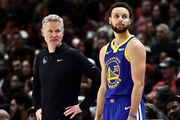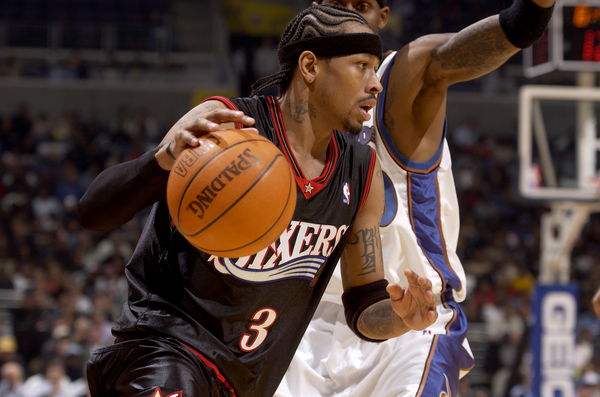

Standing at just 6 feet tall in a league of giants, Allen Iverson revolutionized the NBA with his fearless style of play. Who even dares to cross up Michael Jordan as a rookie? The 11x All-Star and 2001 MVP wasn’t just a basketball phenomenon who averaged 26.7 points per game over his career–he was a cultural icon who challenged the NBA’s status quo, from his signature cornrows and tattoos to his famous “practice” rant that still echoes through sports culture today.
Watch What’s Trending Now!
Now, with the release of a bonus trailer, a groundbreaking documentary titled “WRONG BALL: The Allen Iverson Way” aims to tell his story through a different lens. Produced by Lisa Hampton, the documentary explores Iverson’s journey not just as a basketball legend, but as a figure who embodied a pivotal moment in American history, as she revealed in an email interview with EssentiallySports.
ADVERTISEMENT
Lisa Hampton on the WRONG BALL documentary
Hampton’s vision for “WRONG BALL” was born years ago, when she wrote in the margins of Angela Davis’ “Women, Race, & Class” about her dream to create a story about Iverson alongside other NBA icons like Kevin Garnett, Kobe Bryant, and Jermaine O’Neal. “Years ago, I wrote in the back of a school book written by Angela Y. Davis (Women. Race. & Class- see attached) that one day when I grow up in this space, I would create a story about Allen Iverson, Kevin Garnett, Kobe Bryant and Jermaine O’Neal,” Hampton revealed in the interview.
Unlike most documentaries, it attempts to look at Iverson’s life through the lens of sports sociology, but through Iverson’s experiences in light of social movements. The series digs into Iverson’s early life, peaking at a significant moment as a 17-year-old. He faced criminal proceedings that threatened to ruin his budding athletic career.
Top Stories
Coach Zach O’Brien Sends Clear Message on Unrivaled Officials After Controversial Breanna Stewart Call

Steve Kerr Flatly Rejects Reality as Stephen Curry, Warriors Locker Room Admit Major Disadvantage

Skylar Diggins Turned Heads With Stunning Appearance at The Golden Globes 2026

“End of an Era”: Prayers Pour In as Steve Kerr, Warriors Mourn the Death of 78-YO Rock Legend

JJ Redick Makes Drastic Change to Help LeBron James, Luka Doncic Over NBA’s Unfair Treatment

In a racially charged bowling alley brawl case that had Iverson convicted and sentenced to 15 years and later pardoned in a highly controversial case, this incident served as a turning point for AI, which he uses to bring to life bigger themes of racial injustice in America.
ADVERTISEMENT

Getty
WASHINGTON, DC – NOVEMBER 11: Allen Iverson #3 of the Philadelphia 76ers handles the ball against the Washington Wizards at the MCI Center on November 11, 2003 in Washington, DC. NOTE TO USER: User expressly acknowledges and agrees that, by downloading and or using this photograph, User is consenting to the terms and conditions of the Getty Images License Agreement. (Photo by G Fiume/Getty Images)
“WRONG BALL” takes a careful approach to some sensitive subjects. Hampton says she is committed to telling Iverson’s story with dignity, especially when she tells about his time as a prisoner. “I will admit that I went the extra mile not to focus on “prisoner” Allen Iverson and to protect the image that youth will see. For example, I did not want either the trailers or the documentary to open with a group of children referring to him as a thug, a criminal, or an inhumane person. As a result, information necessary to reveal his story will be revealed with no bars,” Hampton further added. But there’s more to this documentary.
ADVERTISEMENT
The documentary will focus on the real Allen Iverson
Iverson is one of the few NBA players to have a meaning behind each of his tattoos. The same aspect has been carefully dealt with in the documentary by Hampton. “At the same time, I have addressed those issues of “people are afraid of him, the cornrows, tattoos and entourage…” by addressing each issue. I know the audiences will benefit from the lessons shared and the manner in which I chose to craft those issues.”
Iverson has a minimum of 20 tattoos, each representing a unique memory or meaning. A tribute to his hometown of Virginia and the bulldog emblem of the Georgetown Hoyas basketball club is among the artwork on Allen Iverson’s body. In addition, the 49-year-old has multiple tattoos with the names of his crew, “Cru Thik,” and his own record label. Iverson also has the initials of his grandma and mother inked on his chest.
ADVERTISEMENT
The documentary promises to present Iverson’s story as it’s never been told before, raw, real, and relevant. “I want to be mindful that his story, including his personal life, has serious topics. I have managed to create a story that balances the most critical topics in his life to include his marriage, fatherhood, and fiscal and financial matters for edification not degradation,” Hampton wrote in the email.
This was all done by the producer while maintaining a careful balance between highlighting his triumphs and acknowledging his struggles, all within the context of America’s evolving social landscape.
ADVERTISEMENT
ADVERTISEMENT
ADVERTISEMENT

